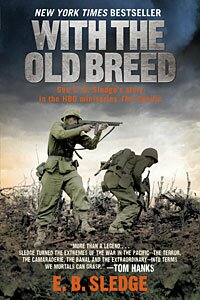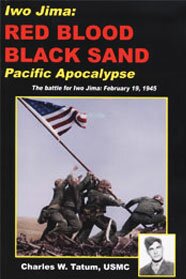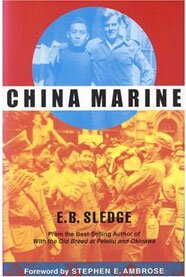Books
The following books were used as source material for The Pacific mini-series. This is not a complete list as some other books such as James Bradley’s Flyboys were also used in early script drafts but later dropped due to budget constraints. The two main books that create the basis for what we’ll see on television are With the Old Breed: At Peleliu and Okinawa by E.B. Sledge and Helmet for My Pillow: From Parris Island to the Pacific by Robert Leckie. Additional material was adapted from Iwo Jima: Red Blood, Black Sand by Chuck Tatum, and China Marine, by Eugene B. Sledge. On their own, these are very outstanding books that should be read by anyone wanting to get an understanding of the human experience of war in the Pacific.
With the Old Breed: At Peleliu and Okinawa
by E.B. Sledge (played by actor Joseph Mazzello as Sledge)
 Read a chapter excerpt here
Read a chapter excerpt here
In The Wall Street Journal, Victor Davis Hanson named With the Old Breed one of the top five books on epic twentieth-century battles. Studs Terkel interviewed the author for his definitive oral history, The Good War. Now E. B. Sledge’s acclaimed first-person account of fighting at Peleliu and Okinawa returns to thrill, edify, and inspire a new generation.
An Alabama boy steeped in American history and enamored of such heroes as George Washington and Daniel Boone, Eugene B. Sledge became part of the war’s famous 1st Marine Division–3d Battalion, 5th Marines. Even after intense training, he was shocked to be thrown into the battle of Peleliu, where “the world was a nightmare of flashes, explosions, and snapping bullets.” By the time Sledge hit the hell of Okinawa, he was a combat vet, still filled with fear but no longer with panic.
Based on notes Sledge secretly kept in a copy of the New Testament, With the Old Breed captures with utter simplicity and searing honesty the experience of a soldier in the fierce Pacific Theater. Here is what saved, threatened, and changed his life. Here, too, is the story of how he learned to hate and kill–and came to love–his fellow man.
(From the paperback edition)
“Eugene Sledge became more than a legend with his memoir, With The Old Breed. He became a chronicler, a historian, a storyteller who turns the extremes of the war in the Pacific —the terror, the camaraderie, the banal and the extraordinary—into terms we mortals can grasp.”
—Tom Hanks, producer of THE PACIFIC
Helmet for My Pillow: From Parris Island to the Pacific
by Robert Leckie (played by actor James Badge Dale as Leckie)
 Read a chapter excerpt here
Read a chapter excerpt here
Here is one of the most riveting first-person accounts ever to come out of World War II. Robert Leckie enlisted in the United States Marine Corps in January 1942, shortly after the Japanese attack on Pearl Harbor. In Helmet for My Pillow we follow his odyssey, from basic training on Parris Island, South Carolina, all the way to the raging battles in the Pacific, where some of the war’s fiercest fighting took place. Recounting his service with the 1st Marine Division and the brutal action on Guadalcanal, New Britain, and Peleliu, Leckie spares no detail of the horrors and sacrifices of war, painting an unvarnished portrait of how real warriors are made, fight, and often die in the defense of their country.
From the live-for-today rowdiness of marines on leave to the terrors of jungle warfare against an enemy determined to fight to the last man, Leckie describes what war is really like when victory can only be measured inch by bloody inch. Woven throughout are Leckie’s hard-won, eloquent, and thoroughly unsentimental meditations on the meaning of war and why we fight. Unparalleled in its immediacy and accuracy, Helmet for My Pillow will leave no reader untouched. This is a book that brings you as close to the mud, the blood, and the experience of war as it is safe to come.
“Helmet for My Pillow is a grand and epic prose poem. Robert Leckie’s theme is the purely human experience of war in the Pacific, written in the graceful imagery of a human being who—somehow survived.”
—Tom Hanks, producer of THE PACIFIC
Secondary Sources Used in the Pacific miniseries include:
Iwo Jima: Red Blood, Black Sand
by Chuck Tatum
 The capture of Iwo Jima was supposed to have taken three days with relatively minor casualties. More than a month later, 6,821 Americans were dead. The story of Iwo has been told many times before, but this latest account is through the eyes of a Marine PFC. whose experiences, thoughts and feelings are now ours to share. The account focuses not only on the author’s experiences but upon those of the men he served with.
The capture of Iwo Jima was supposed to have taken three days with relatively minor casualties. More than a month later, 6,821 Americans were dead. The story of Iwo has been told many times before, but this latest account is through the eyes of a Marine PFC. whose experiences, thoughts and feelings are now ours to share. The account focuses not only on the author’s experiences but upon those of the men he served with.
An unusual aspect is the inclusion of memoirs of several Japanese officers, offering a different, yet very relevant perspective. This is a contribution to the greater historical account. It is a personalized view of a cataclysmic event, but most of all, it is a tribute to the men who served and who sacrificed under the most arduous of circumstances.
328 pages, 330 photos, maps and illustrations. Purchase a copy here!
“For someone like myself, an Iwo Jima survivor, it (Iwo Jima: RED BLOOD, BLACK SAND, Pacific Apocalypse) brought back all the bitter memories of our descent through the gates of hell that was Iwo Jima. One word describes the book. TERRIFIC!”
—Stan Dobowski, Secretary, Iwo Jima Survivor’s Association
China Marine
by E. B. Sledge
 China Marine is the long-awaited sequel to E. B. Sledge’s critically acclaimed memoir, With the Old Breed at Peleliu and Okinawa. Picking up where his previous memoir leaves off, Sledge, a young marine in the First Division, traces his company’s movements and charts his own “difficult passage to peace” following his horrific experiences of battle in the Pacific Theater. He reflects on his north China duty in the ancient city of Peiping – now Beijing – and recounts the difficulty of returning to his hometown of Mobile, Alabama, and resuming civilian life haunted by the shadows of close combat. Distinguished historians have praised Sledge’s first book as the definitive rifleman’s account of World War II, ranking it with the Civil War’s Red Badge of Courage and World War I’s All Quiet on the Western Front. Although With the Old Breed ends with the surrender of Japan, marines in the Pacific were still faced with the mission of disarming the immense Japanese forces on the Asian mainland and reestablishing order. For infantrymen so long engaged in the savage and surreal world of close combat, there remained the personal tasks of regaining normalcy and dealing with suppressed memories, fears, and guilt. In China Marine, E. B. Sledge completes his story and provides emotional closure to the scarring events detailed in his first memoir. Through burgeoning friendships with a Chinese physician and his wife and with a Flemish priest and former prisoner of the Japanese, Sledge experiences compassion, care, and culturally rich evenings of food, conversation, and classical music. He speaks frankly about the real costs of war, emotional and psychological as well as physical, and explains the lifetime loyalties that develop between men who face fear, loss, and horror together. That knowing bond becomes one of the newfound treasures of life after battle. With his hallmark style of simplicity, directness, and lack of sentimentality, “Sledgehammer” has given us yet another great document of war literature.
China Marine is the long-awaited sequel to E. B. Sledge’s critically acclaimed memoir, With the Old Breed at Peleliu and Okinawa. Picking up where his previous memoir leaves off, Sledge, a young marine in the First Division, traces his company’s movements and charts his own “difficult passage to peace” following his horrific experiences of battle in the Pacific Theater. He reflects on his north China duty in the ancient city of Peiping – now Beijing – and recounts the difficulty of returning to his hometown of Mobile, Alabama, and resuming civilian life haunted by the shadows of close combat. Distinguished historians have praised Sledge’s first book as the definitive rifleman’s account of World War II, ranking it with the Civil War’s Red Badge of Courage and World War I’s All Quiet on the Western Front. Although With the Old Breed ends with the surrender of Japan, marines in the Pacific were still faced with the mission of disarming the immense Japanese forces on the Asian mainland and reestablishing order. For infantrymen so long engaged in the savage and surreal world of close combat, there remained the personal tasks of regaining normalcy and dealing with suppressed memories, fears, and guilt. In China Marine, E. B. Sledge completes his story and provides emotional closure to the scarring events detailed in his first memoir. Through burgeoning friendships with a Chinese physician and his wife and with a Flemish priest and former prisoner of the Japanese, Sledge experiences compassion, care, and culturally rich evenings of food, conversation, and classical music. He speaks frankly about the real costs of war, emotional and psychological as well as physical, and explains the lifetime loyalties that develop between men who face fear, loss, and horror together. That knowing bond becomes one of the newfound treasures of life after battle. With his hallmark style of simplicity, directness, and lack of sentimentality, “Sledgehammer” has given us yet another great document of war literature.

